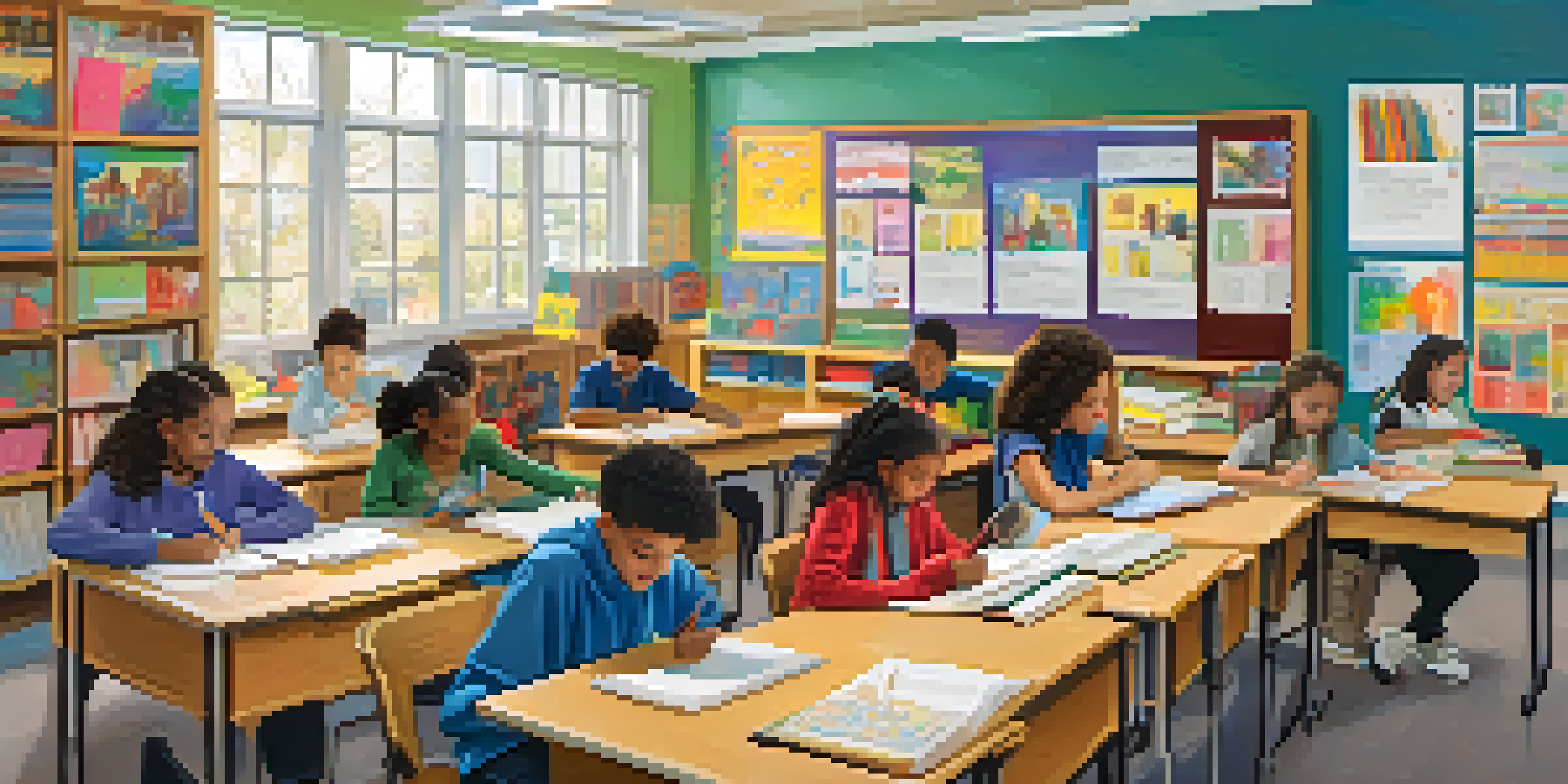The Role of Policy in Shaping Global Education Trends

Understanding the Importance of Education Policy
Education policy serves as a blueprint for how educational systems operate. It encompasses laws, regulations, and guidelines that dictate everything from curriculum standards to funding allocations. By establishing clear objectives, education policies ensure that all students have access to quality learning opportunities, regardless of their background.
Education is the most powerful weapon which you can use to change the world.
For example, in many countries, policies are designed to promote inclusivity, addressing the needs of marginalized groups. This not only helps in leveling the playing field but also enriches the educational experience for all students. When policies prioritize equity, they lay the groundwork for a more just society.
Moreover, the role of education policy extends beyond immediate educational outcomes. It shapes societal values and expectations about education, influencing how communities perceive the importance of lifelong learning and skill development.
Globalization and Its Influence on Education Policies
Globalization has transformed the landscape of education, prompting countries to adapt their policies to meet new challenges. As the world becomes more connected, educational institutions must prepare students for a global workforce that demands diverse skills and competencies. This shift has led many governments to reevaluate their educational frameworks.

For instance, countries are increasingly emphasizing STEM (Science, Technology, Engineering, and Mathematics) education to compete in a technology-driven economy. Policies that support STEM initiatives not only foster innovation but also ensure that students are equipped with the skills necessary for the future job market.
Education Policy Shapes Access
Effective education policies ensure that all students, regardless of their background, have access to quality learning opportunities.
Additionally, the exchange of ideas and practices across borders has led to the adoption of successful educational models from around the world. This sharing of knowledge can drive countries to reform their policies in ways that enhance educational quality and effectiveness.
The Role of International Organizations in Education Policy
International organizations, such as UNESCO and the World Bank, play a pivotal role in shaping global education trends through their policy recommendations. These organizations conduct extensive research to identify best practices and provide guidance to governments on how to improve their educational systems. Their influence helps ensure that education policies are informed by global standards and research.
The function of education is to teach one to think intensively and to think critically. Intelligence plus character – that is the goal of true education.
For example, UNESCO's Education for All initiative aims to provide universal access to quality education, guiding countries in developing inclusive policies. By aligning national policies with international goals, countries can work together to address global educational challenges, such as illiteracy and educational inequality.
Moreover, these organizations often provide funding and resources to help implement policy changes. Their support can be crucial for countries with limited resources, allowing them to make significant strides in improving educational access and quality.
Education Policy and Technological Advancements
As technology continues to evolve, education policies must adapt to incorporate new tools and methodologies. The rise of online learning platforms and digital resources has prompted many countries to rethink their traditional educational approaches. Policies that embrace technology can enhance learning experiences and make education more accessible.
For example, during the COVID-19 pandemic, many schools turned to online learning as a temporary solution. This shift highlighted the need for policies that support digital literacy and technology integration in the classroom. Moving forward, education policies that prioritize technological advancements will likely become essential for preparing students for a rapidly changing world.
Globalization Demands Policy Adaptation
As the world becomes more interconnected, countries must adapt their education policies to prepare students for a diverse and competitive global workforce.
Additionally, the use of data analytics in education can inform policy decisions by providing insights into student performance and learning outcomes. By leveraging technology, policymakers can create more effective strategies that cater to the diverse needs of learners.
Cultural Influences on Education Policy Development
Education policies are often deeply influenced by a country’s cultural values and beliefs. Each nation has its unique perspective on what constitutes quality education, which shapes its policies and practices. Understanding these cultural nuances is essential for developing effective education systems that resonate with the local population.
For instance, in collectivist cultures, education policies may emphasize group learning and collaboration over individual achievement. This cultural perspective can lead to different teaching styles and assessment methods that align with societal norms. By reflecting cultural values in education policies, countries can enhance community buy-in and support.
Moreover, as societies become more multicultural, education policies must evolve to recognize and respect diverse cultural backgrounds. This can involve integrating multicultural education into the curriculum, which not only enriches learning but also fosters respect and understanding among students.
The Impact of Local Governance on Education Policies
Local governance plays a crucial role in implementing education policies effectively. While national policies set the framework, local authorities are responsible for adapting these policies to meet the specific needs of their communities. This localized approach ensures that education remains relevant and responsive to the unique challenges faced by different regions.
For example, rural areas may require different resources and support compared to urban centers. Local governments can tailor their policies to address issues such as transportation, technology access, and teacher recruitment, ensuring that all students receive a quality education.
Cultural Values Influence Policies
Education policies are influenced by a nation's cultural values, which shape their educational practices and approaches to learning.
Furthermore, community involvement in education policy development can lead to more effective solutions. When stakeholders, including parents and educators, participate in decision-making processes, policies are more likely to reflect the values and needs of the community.
Future Trends in Education Policy and Global Learning
As we look ahead, several trends are emerging that will likely shape the future of education policy globally. One significant trend is the growing emphasis on social-emotional learning (SEL), which recognizes the importance of emotional intelligence in student development. Policies that integrate SEL into curricula can foster resilience and improve overall student well-being.
Another trend is the increasing focus on environmental education, as global awareness of climate change rises. Policies that promote sustainability and environmental stewardship can prepare students to become responsible global citizens who are equipped to address pressing global challenges.

Lastly, the rise of personalized learning is revolutionizing the educational landscape. Education policies that support individualized learning paths can cater to the diverse needs of students, ensuring that every learner has the opportunity to succeed.